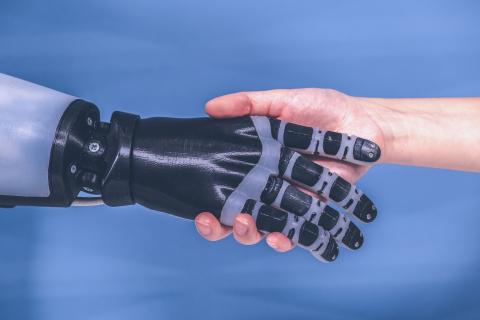Osaka Expo, the T-POWER project coordinated by the University of Florence on precision medicine, robotics, and social well-being. The contribution of the Sant'Anna School of Advanced Studies in Pisa
Inspired by the Tuscany Health Ecosystem, T-POWER's research involves Tuscan universities and the CNR. It will be presented on July 17 and 18 in the Italian Pavilion

On July 17 and 18, at the Expo in Osaka, "T-POWER: Life Sciences Made in Tuscany. Innovating for Saving, Empowering, and Connecting Lives," a project coordinated by the University of Florence and dedicated to Life Sciences, with Unifi leading a partnership composed of the Universities of Pisa, Siena, the University for Foreigners of Siena, the Scuola Normale Superiore and the Scuola Superiore Sant'Anna of Pisa, and the National Research Council - National Institute of Optics (CNR-INO).
T-POWER draws inspiration from the innovation ecosystem Tuscany Health Ecosystem (THE) – funded by the National Recovery and Resilience Plan (PNRR) – which represents a unique model of cooperation between higher education, scientific institutions, businesses, the healthcare system, and the community in Italy.
The project's cornerstones are innovation in precision diagnostics and personalized medicine, robotic technologies and assistive solutions, as well as projects for social well-being and inclusion.
Within the Italian Pavilion, the T-POWER space will host a permanent video installation, curated by the University of Florence, which will illustrate the Tuscan model for an integrated Life Sciences ecosystem based on the three priorities of the Osaka Expo: saving lives, empowering lives, and connecting lives. The film will show the technological and scientific progress of Tuscan Life Sciences, as well as their impact on individuals and the community, integrating historical and artistic elements and the unique characteristics of the region.
Visitors will be able to learn about and explore biomedical innovations in precision diagnostics and personalized medicine, robotics, and social well-being thanks to an exhibition coordinated by the University of Pisa, featuring prototypes that will be presented in the morning by researchers from the project partners and developed within THE.
In the afternoon, the T-POWER space will host thematic meetings and workshops, coordinated by the CNR in Pisa, dedicated to cancer research, neuroscience, advanced radiotherapy, active aging, and precision medicine. These events will be opportunities for exchange and collaboration with Japanese universities, research centers, and companies, with the aim of strengthening international scientific dialogue and promoting new synergies.
T-POWER aims to be a global hub, promoting shared solutions to the healthcare challenges of the future, in line with the UN's Sustainable Development Goals.
The contribution of the Sant'Anna School of Pisa
As part of the T-POWER: Life Sciences Made in Tuscany project, the Sant'Anna School of Advanced Studies in Pisa is setting up a demonstration of artificial skin with photonic sensors for collaborative robotics. An anthropomorphic robotic arm will be presented with patches of artificial skin integrated with fiber optic sensors (Bragg fiber grating sensors - FBG). A bio-inspired algorithm allows the site and type of contact applied to one of the artificial skin patches to be identified. The public will be able to interact with the robot through the patches and view these interactions in real time on a graphical interface. The overall objective is to educate the public about safe human-machine interaction solutions enabled by innovative tactile sensors in collaborative robotics contexts."The contribution of the Sant'Anna School of Advanced Studies to the Tuscan social and healthcare ecosystem is based on its ability to build bridges between scientific research and the needs of the local area. In line with the three priorities of Expo – saving lives, empowering lives, connecting lives – the School promotes a paradigm based on the principle of proximity, bringing research and innovative solutions ever closer to the population, with a particular focus on healthcare needs in the region's inland areas.
To address and overcome the challenge of the last mile of implementation – often the most insidious – it is vital to activate synergies between the regional health service, the third sector, public institutions, academia, and the business system, creating an integrated system capable of combining quality, equity, and sustainability of care," says Nicola Bellè, associate professor at the Institute of Management and Sant'Anna School representative for the T-Power project.
The photos in the gallery show one of the prototypes developed by the Sant'Anna School of Advanced Studies that will be presented at the Expo in Osaka.






